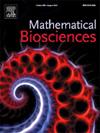Unraveling the influence of the objective functional on epidemic optimal control: Insights from the SIR model
IF 1.8
4区 数学
Q2 BIOLOGY
引用次数: 0
Abstract
In the application of optimal control theory to medical and biological problems, the dependence of the objective functional on the control variable is often subject to uncertainty. This study examines the effects of this dependency on the outcomes of optimal control problems in the context of disease control using the SIR model. We formulate two distinct optimal control problems: one for the control of disease spread through prophylactic vaccination, and another for the treatment of infected individuals. For each scenario, we propose four variations of the objective functional to capture the cost of control interventions, namely, quadratic state-independent, quadratic state-dependent, linear state-independent, and linear state-dependent. We also conduct numerical simulations to compare optimal control solutions across different weight parameters. While some qualitative characteristics of the control profiles are similar in certain scenarios, there are also notable differences suggesting that the choice of objective functional can substantially alter the resulting control profiles. Consequently, when there is uncertainty regarding the functional form of the objective and its relationship to the control parameter, it is recommended to evaluate multiple objectives and subsequently identify which solution is most suitable for practical implementation.
揭示目标函数对流行病最优控制的影响:来自SIR模型的见解
在将最优控制理论应用于医学和生物问题时,目标泛函对控制变量的依赖往往具有不确定性。本研究使用SIR模型检验了这种依赖对疾病控制背景下最优控制问题结果的影响。我们提出了两个不同的最优控制问题:一个用于通过预防性接种控制疾病传播,另一个用于治疗受感染的个体。对于每种情况,我们提出了目标函数的四种变体来捕捉控制干预的成本,即二次状态无关,二次状态依赖,线性状态无关和线性状态依赖。我们还进行了数值模拟,以比较不同权重参数下的最优控制方案。虽然在某些情况下,控制概况的一些定性特征是相似的,但也存在显著的差异,表明目标函数的选择可以实质上改变最终的控制概况。因此,当目标的功能形式及其与控制参数的关系存在不确定性时,建议对多个目标进行评估,然后确定哪个解决方案最适合实际实施。
本文章由计算机程序翻译,如有差异,请以英文原文为准。
求助全文
约1分钟内获得全文
求助全文
来源期刊

Mathematical Biosciences
生物-生物学
CiteScore
7.50
自引率
2.30%
发文量
67
审稿时长
18 days
期刊介绍:
Mathematical Biosciences publishes work providing new concepts or new understanding of biological systems using mathematical models, or methodological articles likely to find application to multiple biological systems. Papers are expected to present a major research finding of broad significance for the biological sciences, or mathematical biology. Mathematical Biosciences welcomes original research articles, letters, reviews and perspectives.
 求助内容:
求助内容: 应助结果提醒方式:
应助结果提醒方式:


